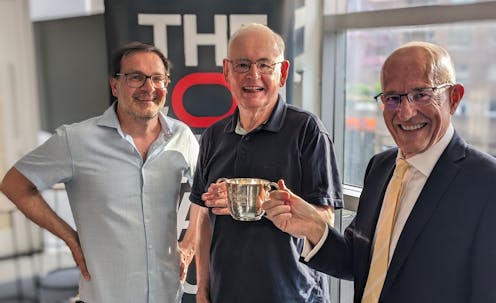Detta inlägg post publicerades ursprungligen på denna sida this site ;
Date:
Author: Laura Hood, Senior Politics Editor, Assistant Editor, The Conversation (UK edition)
Original article: https://theconversation.com/the-2024-sir-paul-curran-award-for-academic-journalism-goes-to-paul-whiteley-256376

Paul Whiteley, emeritus professor of government at the University of Essex, has been named as the 2024 winner of the Sir Paul Curran award for academic communication.
The prize is awarded every year to an academic who has shown exceptional skill, dedication and engagement in communicating their knowledge to readers.
Paul has contributed 120 articles to The Conversation since August 2014, helping readers understand the seismic political shifts that have taken place over that period. He’s written about British and US politics, Brexit, emerging and historical electoral patterns and voter behaviour. He has contributed to The Conversation’s coverage of every British election that has taken place since launching in the UK and has written some of our strongest, evidence-based analysis of Brexit since the referendum in 2016. Paul was one of the contributors who answered The Conversation’s call for submissions in its earliest days and has featured regularly ever since.
The Politics + Society team asked for Paul to be recognised this year in particular because his work formed the cornerstone of The Conversation’s 2024 election coverage. He analysed dozens of past elections to help us understand where the campaign was going wrong for former prime minister Rishi Sunak, and issued some warnings to the Labour party about the perils of a victory based on low turnout. He also helped readers digest the various MRP polls that appeared to be shaping as well as measuring the campaign.
Paul’s award was linked to his work analysing the rise of the Reform party at a time when hard evidence is hard to come by. Paul has looked at how protest voting is tied to Reform voting, and what it means for Reform to be advancing in the polls at this stage in the electoral cycle. He’s issued advice to Labour and the Conservatives as they try to produce a response to this new electoral threat.
More recently, Paul has turned his attention to US politics to help readers understand the politics of Donald Trump.
Paul is the author of multiple books, including Brexit Britain: The Consequences of the Vote to Leave the European Union, Political Choice in Britain and Political Participation in Britain: The Decline and Revival of Civic Culture.
On the night, we thanked Paul for his 120 articles and looked forward to reading his next 120.
Highly commended
This year, two academic writers also received commendations.
Michelle Spear, professor of anatomy at the University of Bristol, was highly commended for her “entertaining, illuminating and often hilarious” articles about the human body. Her work has included fact checks on full-body deodorants and collagen supplements. Michelle was also the author of a grizzly investigation for Guy Fawkes night that looked at what actually happened when people were hanged, drawn and quartered.
Ruth Itzhaki professor emeritus of molecular neurobiology at the University of Manchester and visiting professorial fellow at the University of Oxford, received special commendation for her work on the viral cause of Alzheimer’s. Ruth and colleagues first identified a possible link between cold sores and susceptibility to Alzheimer’s in later life. She wrote an Insights long read as part of the Uncharted Brain: Decoding Dementia series in 2022, and in recent weeks has written again following greater recognition, decades later, of her work.
A huge thank you to Paul, Michelle and Ruth for their work with The Conversation over the years, and to all our authors – without whose efforts there would be no conversation.
![]()